|
Advantech AIMB-256
Advanced Intel Core 2 Duo Mini-ITX motherboard for complex industrial and embedded applications
(by Conrad H. Blickenstorfer)
Most people don't spend a lot of time thinking about computer motherboards. They are just inside the PC and do their job. To system integrators, however, the choice of the right motherboard is a big issue. Here are some of the criteria for selecting a motherboard:
- Space considerations
- Processor and chipset technology
- Power requirements
- Interface requirements
- Standards support
There are, in fact, about two dozen different computer board form factors. Not all of them are full motherboards. Sometimes, system integrators prefer to use Computer On Module (COM) technology where the generic computing "engine" resides on a separate board that is then plugged into a "carrier" board designed for some specific purpose. This way, system integrators can select the right COM for a complex embedded systems project and then concentrate on their application rather than having to design an entire computer from scratch, saving as much as 80% of the regular development time and cost.
Other times the task at hand can best be filled by a fully integrated conventional motherboard, but there are very detailed requirements and space is an issue. In that case, you'd be looking for a board with just the right functionality that also fits into the alloted space. For example, let's assume an application requires ample computing power and memory, support of multiple displays, multiple disks, dual high speed Ethernet ports, as many USB ports as possible, and also extensive RS232 legacy support. The system should also be bootable from a CF card and the board's footprint shouldn't be larger than about seven by seven inches. There is no need for more than one expansion slot. Enter...
The Advantech AIMB-256 Mini-ITX board
The answer would be a Mini-ITX board. The Mini-ITX form factor has been around since 2001 and specifies a 17 x 17 centimeter (6.7 x 6.7 inches) low-power board. It was originally conceived for entry-level platforms and industrial applications. Unlike some more exotic board types, Mini-ITX board fit into generic computer cases and they use the same screw-mount patterns. Their small size and low power requirements, however, mean that they are perfect for custom applications where a standard PC needs to fit into a small space.
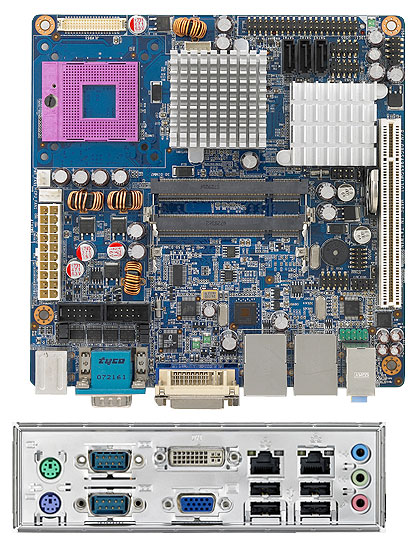 The Advantech AIMB-256 shown here represents the current state-of-the-art in Mini-ITC motherboards. It uses a surface mount 478-pin for the Intel socket 479P and supports 65nm technology Intel Core 2 Duo processors up to 2.2GHz (800 MHz front side bus and 2 x 2MB of L2 cache) or the Intel Celeron M with speeds up to 2.0GHz (533 MHz bus and 1MB of L2 cache). The board uses an AMI BIOS and the Intel GME965 graphics and memory controller with the ICH8M controller hub. There is a single PCI expansion slot. RAM is provided via two 200-pin SODIMM slots that accommodate up to 4GB of 533/667 DDR2 SDRAM. The Advantech AIMB-256 shown here represents the current state-of-the-art in Mini-ITC motherboards. It uses a surface mount 478-pin for the Intel socket 479P and supports 65nm technology Intel Core 2 Duo processors up to 2.2GHz (800 MHz front side bus and 2 x 2MB of L2 cache) or the Intel Celeron M with speeds up to 2.0GHz (533 MHz bus and 1MB of L2 cache). The board uses an AMI BIOS and the Intel GME965 graphics and memory controller with the ICH8M controller hub. There is a single PCI expansion slot. RAM is provided via two 200-pin SODIMM slots that accommodate up to 4GB of 533/667 DDR2 SDRAM.
The AIMB-256 has onboard graphics using the Intel GME965 with the X3100 graphics media accelerator that supports up to 384MB shared system video memory. Dual displays are supported via standard rear I/O VGA and DVI ports as well as the dual channel 24-bit LVDS connector on the board itself. Any two of the three can be actively displaying video at a time.
The board supports 10/100/1000Base-T gigabit Ethernet, and there are two RJ45 jacks on the rear I/O panel. Both LAN1 and LAN2 use Realtek RTL8111B controllers.
For disks and other drives, the board offers a single Ultra DMA 100 EIDE interface as well as three 300 MB/s channels. For solid state disk systems, the board also has a single Compact Flash slot for Type I/II CF cards. It is on the bottom side of the board and the system can boot off it.
The rear I/O panel has four USB 2.0 ports, two legacy PS/2 ports for keyboard and mouse, and two RS232 serial ports. What you see on the rear I/O panel, however, is only part of what the AIM-256 offers. On the board itself are six more USB 2.0 connectors, two additional RS232 serial connectors, the LVDS port, as well as an 8-line Digital I/O (DIO) connector, a LCD inverter connector, the SPI connector, digital audio (in addition to the rear panel microphone, speaker and headphone jacks.
As is usually the case on a motherboard, there is a good number of jumpers. The four COM ports can be set for 5 Volts, 12 Volts or Ring. The single power connector can be either in AT mode or in ATX mode. There is a jumper to clear CMOS data.
Anyone who has ever built their own PC from parts knows about the system panel connector that interacts with buttons and lights on the case or enclosure. It connects to the system power LED, reset button, power button, and hard disk activity light. That's no different on a Mini-ITX board.
The BIOS offers the usual wealth of setup options, both the common sense stuff and the and arcane settings that sometimes make all the difference between an optimized system and one that tends to act up.
What's in the box
Here is what Advantech ships when you buy the AIMB-256 for your project: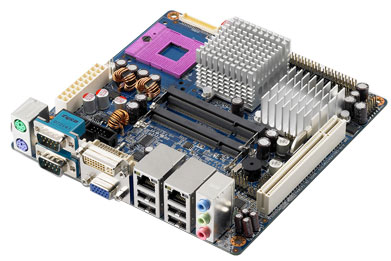
- AIMB-256 SBC Intel GME965 Mini-ITX Main board
- CD-ROM with user manual and all drivers
- Cables/connectors for COM3 and COM4
- 40-pin IDE HDD cable
- two SATA data cables
- two SATA power cables
- I/O shield/panel
- all screws needed for mounting the AIMB-256
- A laminated startup manual wit specs, diagrams and jumper settings
Drivers generally support Windows 2000, Windows XP 32 and 64, Vista 32 and 64, as well as Linux.
Our system came with a 1.06GHz Core 2 Duo U7500 processor, an ultra-low voltage chip with a thermal design power of 10 watts. It also came with the CPU cooler (small, silent fan) for the Core 2 Duo. Everything was clearly labeled and described. We installed the board in an older full-size computer case sitting around the RuggedPCReview office and within less than half an hour it was up and running. Particularly impressive was that the board immediately recognized the 22-inch wide-format HP LCD display we used and offered the proper display resolution. None of the initial booting into VGA mode until drivers are installed.
Mini-ITX has come a long way since the early days of the standard. Yet, while the Advantech AIMB-256 provides Core 2 Duo power and massive connectivity, it retains the ITX spirit of a simple, flexible, power-efficient board for a variety of embedded and/or industrial applications where small size and efficiency matter.
-- Conrad H. Blickenstorfer
Advantech AIMB-256 Specs:
| Type |
Mini-ITX Motherboard
|
| CPU Type |
Core 2 Duo
|
| Chipset |
Intel GME965 + ICH8M
|
| BIOS |
AMI 16 Mb SPI
|
| Memory |
Max 4GB DDR2 533/667 in 2 SDRAM 200-pin SODIMM sockets |
| Graphics Controller |
Intel GME965 GMCH integrated Graphics Media Accelerator X3100 |
| VRAM |
DVMT 4.0 supports shared system memory up to 384 MB video memory, max resolution 2048 x 1536 @ 60 Hz |
| LVDS |
Single channel 18/24-bit Dual channel 36/48-bit LVDS
|
| DVI |
via Chrontel CH7307C SDVO transmitter |
| Dual display |
CRT+LVDS, CRT+DVI, LVDS+DVI
|
| LAN |
2 x 10/100/1000Base-T (Realtek RTL8111B) |
| SATA |
33 x 300 MB/s |
| EIDE |
U1 x Ultra DMA 100
|
| SSD |
Compact flash type I/II slot
|
| USB |
10 x USB 2.0 (4 rear panel, 6 on board) |
| Serial |
4 x RS232 (supply 5V and 12V) |
| Audio |
Audio front panel, CD-in, S/PDIF Out (Realtek ALC888 Audio Codec 5.1+2 ch. with two independent audio streams) |
| DIO |
8-bit General Purpose I/O for DI and DO |
| Size |
170 mm x 170 mm (6.69" x 6.69")
|
| Weight |
0.88 lbs. |
| Operating Temp. |
32 to 140 degrees Fahrenheit |
| Price |
inquire |
| Datasheet |
Advantech AIMB-256 |
| Advantech store |
Advantech Advantech Mini-ITX store |
Advantech Corporation
38 Tesla, Suite 100
Irvine, CA 92618
Toll Free: 1-800-866-6008
Ph: 949-789-7178
Fax: 949-789-7179
ECGInfo@advantech.com
www.advantech.com
Advantech Co. Ltd.
No.1, Alley 20, Lane 26, Rueiguang Road
Neihu District, Taipei Taiwan 114, R.O.C.
Tel: 886-2-2792-7818
Fax: 886-2-2794-7301
www.advantech.com
|

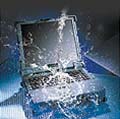

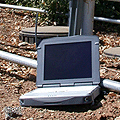

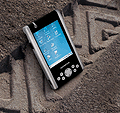
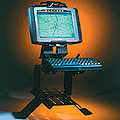





 The Advantech AIMB-256 shown here represents the current state-of-the-art in Mini-ITC motherboards. It uses a surface mount 478-pin for the Intel socket 479P and supports 65nm technology Intel Core 2 Duo processors up to 2.2GHz (800 MHz front side bus and 2 x 2MB of L2 cache) or the Intel Celeron M with speeds up to 2.0GHz (533 MHz bus and 1MB of L2 cache). The board uses an AMI BIOS and the Intel GME965 graphics and memory controller with the ICH8M controller hub. There is a single PCI expansion slot. RAM is provided via two 200-pin SODIMM slots that accommodate up to 4GB of 533/667 DDR2 SDRAM.
The Advantech AIMB-256 shown here represents the current state-of-the-art in Mini-ITC motherboards. It uses a surface mount 478-pin for the Intel socket 479P and supports 65nm technology Intel Core 2 Duo processors up to 2.2GHz (800 MHz front side bus and 2 x 2MB of L2 cache) or the Intel Celeron M with speeds up to 2.0GHz (533 MHz bus and 1MB of L2 cache). The board uses an AMI BIOS and the Intel GME965 graphics and memory controller with the ICH8M controller hub. There is a single PCI expansion slot. RAM is provided via two 200-pin SODIMM slots that accommodate up to 4GB of 533/667 DDR2 SDRAM.
